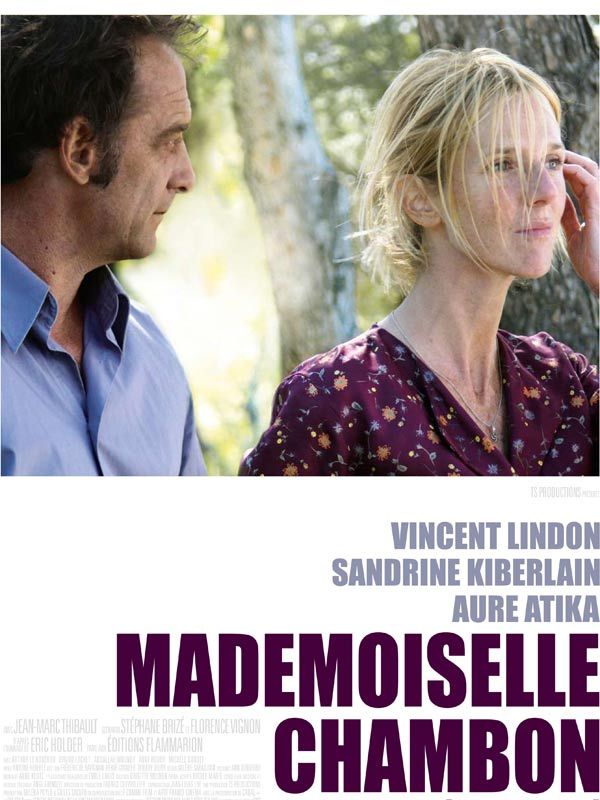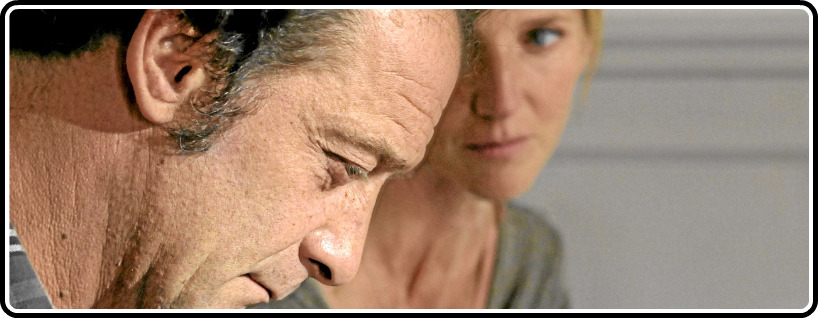Silent sorrow. This is a constant and heartfelt thematic device throughout the film Mademoiselle Chambon, the new film by director Stephane Brize. A simple story about a man named Jean (played wonderfully by Vincent Lindon) who has a happy life with his beautiful wife and son. He’s a working man, a builder who helps create homes from scratch, which is what he tells his son’s class in a great scene, at the behest of the homeroom teacher, Mademoiselle Chambon (played exquisitely by Sandrine Kiberlain). And when they meet for the first time, Jean doesn’t realize his world will be flipped upside down.
We’ve all experienced a love at the wrong place and the wrong time. Something that you know you shouldn’t try to attain but yet still want so badly, on both sides of the table, because there’s this connection you can’t refute. This is what Jean and Veronique experience, that connection that is undeniably there, which we as the audience see in extended takes of almost complete awkward silence between the two. And unlike most films with this familiar plot, the two of them spend more time almost at odds because of the situation and how much it pains the two of them that this probably won’t work at all.
You see the attraction when Jean asks Veronique to play a piece on her violin. While she says she isn’t any good, Jean doesn’t want to insist but almost does, to see what he’ll hear when she plays. And she starts to play and you see the sadness and happiness well up in Jean’s face all at once. Almost seeing his pain and anguish at a life that he may had never had because of circumstances in his past. This is all told by facial expressions, which this film is filled with, and it flourishes because of it.
Their attraction is one which almost doesn’t make sense, only because Veronique knows that Jean is married and has a child. And when Jean tells her he has another child on the way with his wife Anne-Marie, the resistance is there and Veronique decides to run away from this by rejecting the offer to take the teaching gig at the school and go back to Paris, once again leaving her problems behind, which is something that is hinted at when speaking about why she moves very often from school to school.
Vincent Lindon is sort of a revelation to this American viewer. Never seeing him act before, his rugged looks are out of a Hollywood playbook from yesteryear, specifically the 1960’s and 1970’s. His understated performance will probably be overlooked by most American audiences and what a shame that is because he says more in his eyes and his silent demeanor than most actors say in a monologue. And one the other side of this amazing coin is Sandrine Kiberlain’s wounded performance of Mademoiselle Chambon, which just is so simple and beautiful, you can’t help but fall in love with her yourself.
When Jean, learning that Veronique is leaving for good, brings back some CD’s he has borrowed from her and asks her to perform for his father, who has been sick for quite some time (there’s even a darkly comical scene where he goes to look at coffin’s to buy with his father), and she is hesitant at first until Jean tells her that he ‘wants his father to hear something beautiful before he dies.’ Of course she can’t refuse and she does come over to the party and plays a beautifully touching piece. While Jean is visibly shaken and almost on the verge of tears, Anne-Marie looks over and realizes the connection the two have and yet again, a performance of few words but expressions makes for a surprising film.
When Jean drives her home, they don’t speak a word whatsoever, but we watch from the backseat, seeing the two look at one another, and as Veronique starts to wipe away her tears, Jean does nothing at all. Veronique gets out of the car and walks toward her door, violin in tow, and we pan back to Jean, who then starts to cry, tears rolling down his cheeks. This is when we pan back to the outside of the car and we see Veronique looking at him from the door. And we cut to a love scene between the two, who have finally given into their temptation and profess their feelings for one another.
But Veronique is still leaving and Jean tells her he wants to leave with her. And she says something so poignant, it sends chills down your spine. ‘Don’t say it if you don’t mean it.’ And he continues to kiss her and we cut to the next day, while she’s getting in her cab to the train station, we see Jean packed up and hopping into his car and driving off to the station. And one of the most heart wrenching scenes in recent cinema history is depicted in this film, where she is waiting right near the train while Jean is only 50 feet away, down the stairs. He waits, with bag in hand, until the train leaves; Veronique finally getting on. And Jean has chosen his wife and child, perhaps because he felt guilt wash over him. Or is it because he truly loves his wife and son? Or is it just easier to get back into the swing of things in his simple life? It’s an open ended question in a film that deserves to be seen by everyone, especially people who like unconventional romantic films that are a little closer to home than the usual Hollywood fare.
Mademoiselle Chambon is a film that leaves a mark on you and will continue to resonate within until the next time you see it. You feel completely drained and at the same time satisfied It’s also a film that you want to show other people and see what they ultimately take from its story. A new love found and then lost, is it better than never loving at all? That’s only a question that can be answered by the individual watching the film.
Lorber Films is proud to announce the U.S. theatrical release of the French box office hit MADEMOISELLE CHAMBON, directed by Stéphane Brizé and starring Vincent Lindon and Sandrine Kiberlain in a poignant and universal romance of unrequited love. The film will open at New York’s Lincoln Plaza Cinemas on June 11th, followed by a nationwide release to select cities.






1 comment